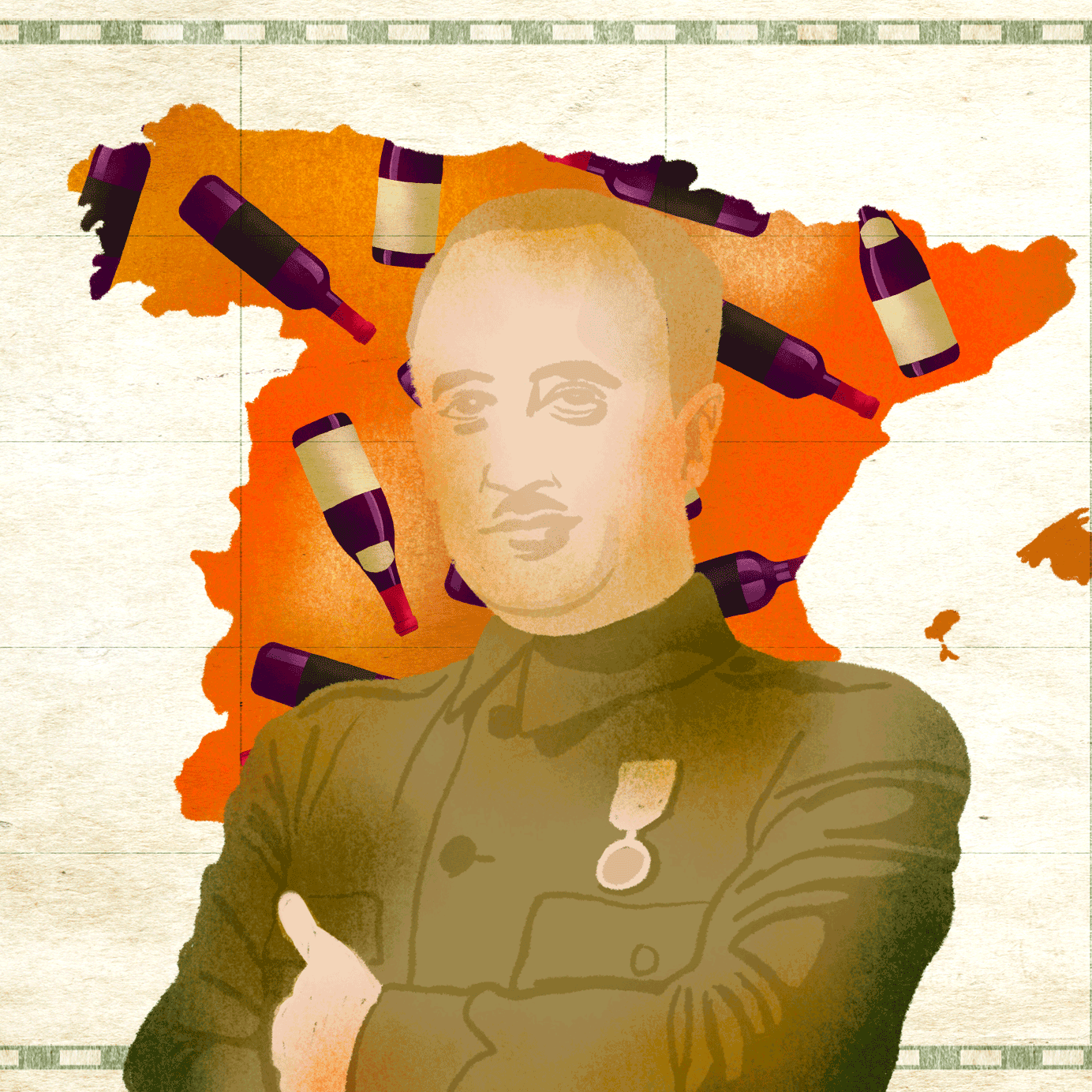In 1936, Francisco Franco was named the “caudillo,” or dictator, of Spain. He gained his position after overthrowing the government during the Spanish Civil War and ruled — many would say ruthlessly — until 1975.
Franco’s rule changed the course of Spain in many ways, including the country’s wine and cheese production: his destruction of vineyards, particularly those producing white wine grapes; push for bulk red wine and quantity over quality; and outlawing artisanal cheese are all effects that can still be felt today.
Although most people are unaware of this snippet of history, says Veronica Stoler, store manager and wine buyer at Despaña Vinos y Más, Franco’s authoritarian rule and disruption of Spanish commerce is “probably one of the most important topics today.”
Franco was a teetotaler and considered wine useful only for sacramental purposes. White wine, not typically used for religious purposes, was seen as frivolous, and so Franco ordered the removal of vines from many white wine-producing regions, including Rueda.
Franco was “partial to Castilian wines, from very warm regions,” says Candela Prol, an independent wine educator based in New York. She explains: “They were really forced to produce in bulk, and the quality was very poor. They didn’t have temperature control — the wines were flabby, high in alcohol, and did not have much flavor.”
This was all by design. “He wanted to sell a lot of wine to boost the economy, but he wasn’t interested in quality,” Prol says. Bulk wines were sold under names like Spanish Sauternes or Spanish Chablis. Rioja’s burly wines gained new footing on the international scene. “He was really unkind to many of the provinces, especially the Catalans,” says Prol.
As subpar bulk wine production pushed on, cheese producers were facing their own setbacks. In the late 1950s, technocrats from the Catholic organization Opus Dei staged a revolution to reestablish a freer economy under Franco. The resulting economic growth was dubbed “The Spanish Miracle.” Still, freedom was not completely restored.
Opus Dei set up production quotas for goods, including cheese. As Spanish cheese consultant Enric Canut told Food & Wine in 2015, “They said, ‘We don’t need producers of 50 kilos of milk a day; you work 10,000 liters a day or you don’t work at all.'”
In doing so, the government essentially outlawed artisanal cheese production, sending small cheese makers underground or out of business.
Spain’s varied landscape, which wine critic Jancis Robinson calls “an anarchic jumble of staggeringly raw scenery,” allowed a cheesescape that was similarly varied. But under this new rule, some traditional Spanish cheeses disappeared.
Others gained new footholds, such as Manchego.
“Spain’s main wine problems,” writes Robinson, “lie not in the vineyard but in the cellar, or rather the cellars of many of the co-operatives that vinify so much of the country’s wine.”
When Franco took over, Spain was in shambles. The civil war had decimated the Spanish economy, the death toll was high, infrastructure was damaged, and rebuilding the country was slow. Initially, Franco cut off international trade and Spain struggled to recover.
Outspoken critics of Franco were exiled. One of these was Felipe Forner, a wine merchant in Valencia, whose business was taken under siege during the Spanish Civil War.
The Forner family was exiled due to the political upheaval. In 1937, the family arrived and settled in France, where they established a vineyard in the Loire Valley.
Felipe passed away shortly after arriving at the age of 40, and his son Enrique worked as a wine merchant before purchasing a few abandoned chateaux in Bordeaux. Over the next few years, Enrique worked to restore them to their former glory.
Cristina Forner, Felipe’s granddaughter and owner of Spanish wine producer Marqués de Cáceres, was born in the Loire Valley. She recounts, “The difficult situation of the exile that my family suffered after losing much of their heritage has been the greatest learning experience in their lives; having to face difficulties with the will to rebuild what they had lost.” It wasn’t until 1970 that Enrique Forner was able to return to his native Spain to found Marqués de Cáceres, which Cristina later moved to Spain to manage with her father.
Franco died in 1975.
Today, Spanish producers are working to restore what was lost. Enric Canut, who studied cheesemaking in Holland, has worked as a consultant with small Spanish cheesemakers to reinvent the Spanish cheeses that disappeared under Franco. Canut has identified about 80 traditional Spanish cheeses that became endangered or extinct. The government has since promoted Spain as “the land of 100 cheeses.”
For the Forners, the chance to go to France and learn winemaking there has led to a global brand. Today, Marqués de Cáceres exports 50 percent of its production to 140 countries. It relies more on Bordeaux-inspired winemaking techniques learned during exile and favors French oak over the typical American oak used in Rioja. “I believe,” says Cristina, “that my heritage, Spanish and French, has helped develop certain creativity and surely a passion for wine.”
The family’s — and indeed, Spain’s — renewed economic freedom is palpable. As Karen MacNeil, author of “The Wine Bible,” told the Napa Valley Register, “Spain is entering a second golden age of wine,” thanks to its renewed economic freedom.
Editor’s note (March 31, 2021): This article previously published a quote from Tim Brown saying: “Franco destroyed the Catalan wine industry.” This quote has been removed due to inaccuracies in his statement and his attribution.
This story is a part of VP Pro, our free platform and newsletter for drinks industry professionals, covering wine, beer, liquor, and beyond. Sign up for VP Pro now!
